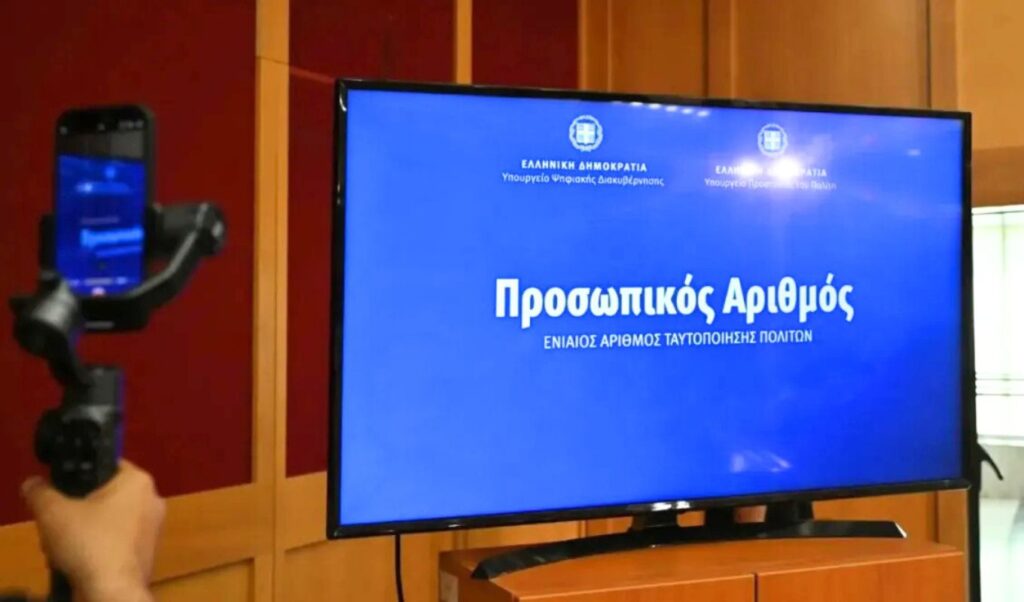Less than a month remains until the extension deadline for issuing the Personal Number. Specifically, citizens will be able to complete the necessary steps for issuing their Personal Number until November 5, in order to avoid delays and complications in their transactions with public services.
In case a citizen does not want to be involved in issuing their Personal Number, the system will randomly select the first 2 digits (which are normally the citizen’s choice), just like the remaining digits, so that each Number is unique for each individual. It should be noted that the third digit is alphabetical and is generated automatically.
It should be noted that if a citizen wants to issue the new identity card, then the Personal Number must have been issued so that it can be properly displayed on the back of the card.
All the steps for issuing the Personal Number
Any citizen who has a tax number (AFM) can easily and quickly issue the Personal Number to be able to comfortably carry out transactions with public services, without needing the social security number (AMKA) or identity card number. Those interested can access the platform pa.gov.gr with their Taxisnet codes and a registered mobile phone number in the National Communication Registry (EMEp), ensuring secure access and protection of personal data.
After logging into the application via Taxisnet codes, citizens will experience double authentication via OTP, allowing them to view and confirm their data in state registries. If they find inaccuracies, they can submit correction requests, either directly through the myInfo platform or at the competent Citizen Service Centers (KEP) or other services. Subsequently, automatic synchronization of registries occurs and the Personal Number is issued, which, as mentioned, remains stable throughout the citizen’s lifetime.
Additionally, the platform provides the ability to submit correction requests in case inaccuracies are found, thus ensuring the accuracy and updating of public registries. Citizens can request corrections both through the digital myInfo application and by contacting competent KEP, public services, or consular authorities when abroad. This process contributes to avoiding duplicate or incorrect identifications and promotes the effectiveness and reliability of the public mechanism for managing personal data.
For certain groups of citizens, special procedures are provided for issuing the Personal Number. For example, minor children will obtain the number through their parent or guardian, either through the myInfo platform or at KEP. Citizens without access to Taxisnet or mobile phones, as well as legal supporters, will be able to obtain the Personal Number with physical presence at postal or consular offices, submitting the necessary documents and identifying themselves.
During the issuance of the Personal Number and to facilitate citizens:
- Citizens can check the municipality where they are registered, utilizing relevant documents that are easily issued through gov.gr, such as the family status certificate,
- Parents can be informed about the automatic assignment of tax numbers to their minor children through the digital applications of the Independent Authority for Public Revenue (AADE).
Questions and answers about your Personal Number
1. What happens if you don’t issue it?
Those who do not proceed with activating the Personal Number risk facing problems with basic services such as submitting tax returns, paying insurance contributions, and electronic transactions with public services.
2. What changes for citizens?
Citizens will need to remember only one number. The Personal Number will be the “digital key” for all public services and, gradually, for private sector services as well.
3. If I change my identity card, will the Personal Number change too?
No. The Personal Number is permanent, unique, and unchangeable for the citizen’s entire lifetime, regardless of changes in identity card, place of residence, or other registry.
4. How will the Personal Number be assigned?
The assignment will be made through the new myInfo application of gov.gr. The citizen will participate in forming the number and will be able to confirm or correct their personal details.
5. Who decides my Personal Number? Do I choose it?
Yes, the citizen can choose two of the three alphanumeric digits that will precede the tax number. The third digit is automatically generated by the system. The choice is made during number issuance through the myInfo application.
6. Who is assigned the Personal Number?
All natural persons who have a tax number or social security number, whether Greek or foreign nationals.
7. What is required for issuing a Personal Number through the myInfo application?
Taxisnet codes and a registered mobile number in the National Communication Registry (EMEp).
8. Where will I see my Personal Number?
On new identity cards (on the back side) and in the digital identity in the gov.gr wallet, as the citizen’s unique identifier in the digital world.
9. Do I need to change my identity card to get the Personal Number?
Not necessarily. You can issue the Personal Number through gov.gr, even before changing your identity card. However, the number will be displayed on new identity cards, so the transition is necessary in the medium term, based on European directive.
10. What does this change serve?
It facilitates interoperability of state registries, reduces citizen inconvenience, and helps correct errors that exist in official registries (Civil Registry, AADE, AMKA, Police, etc.).




